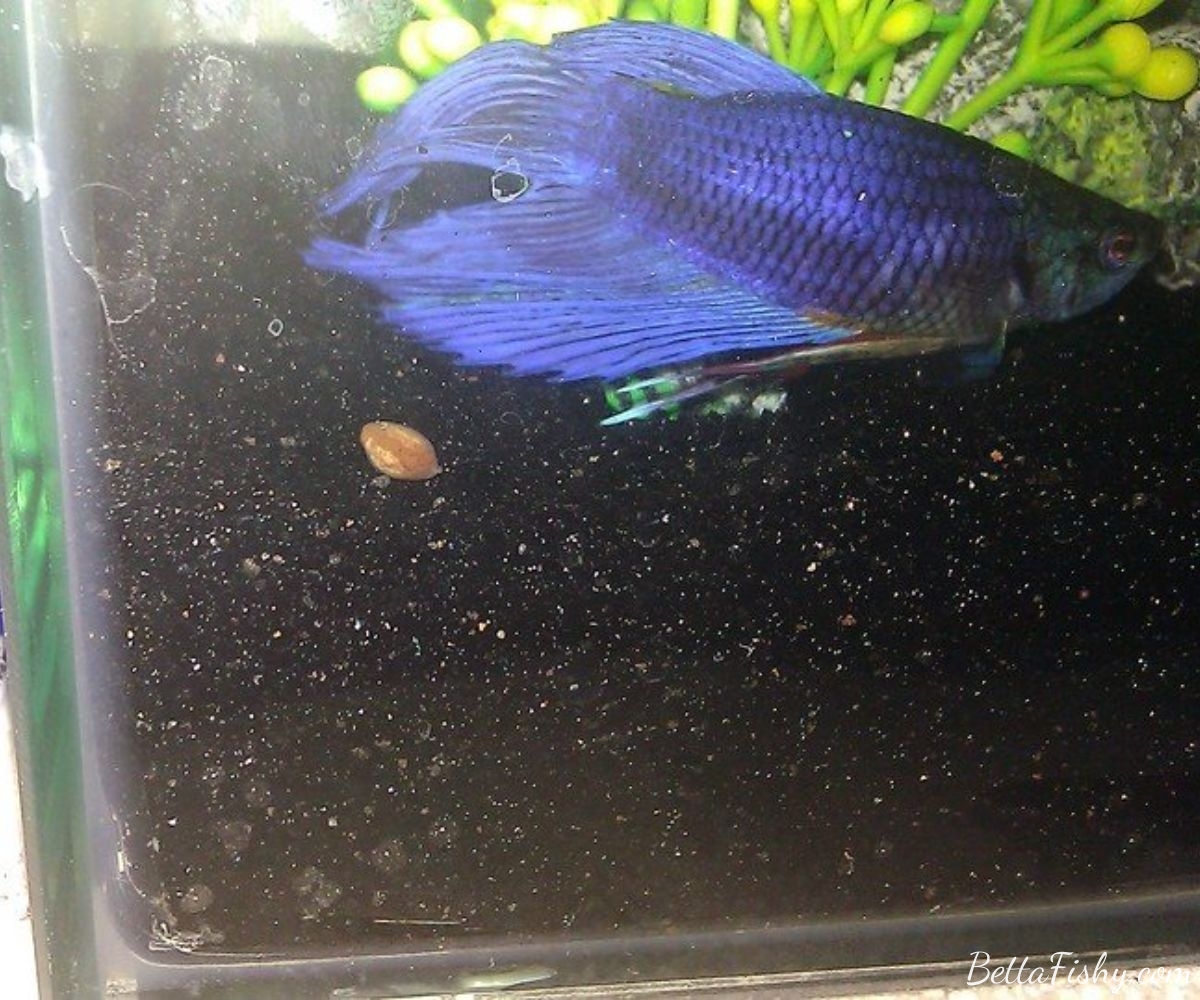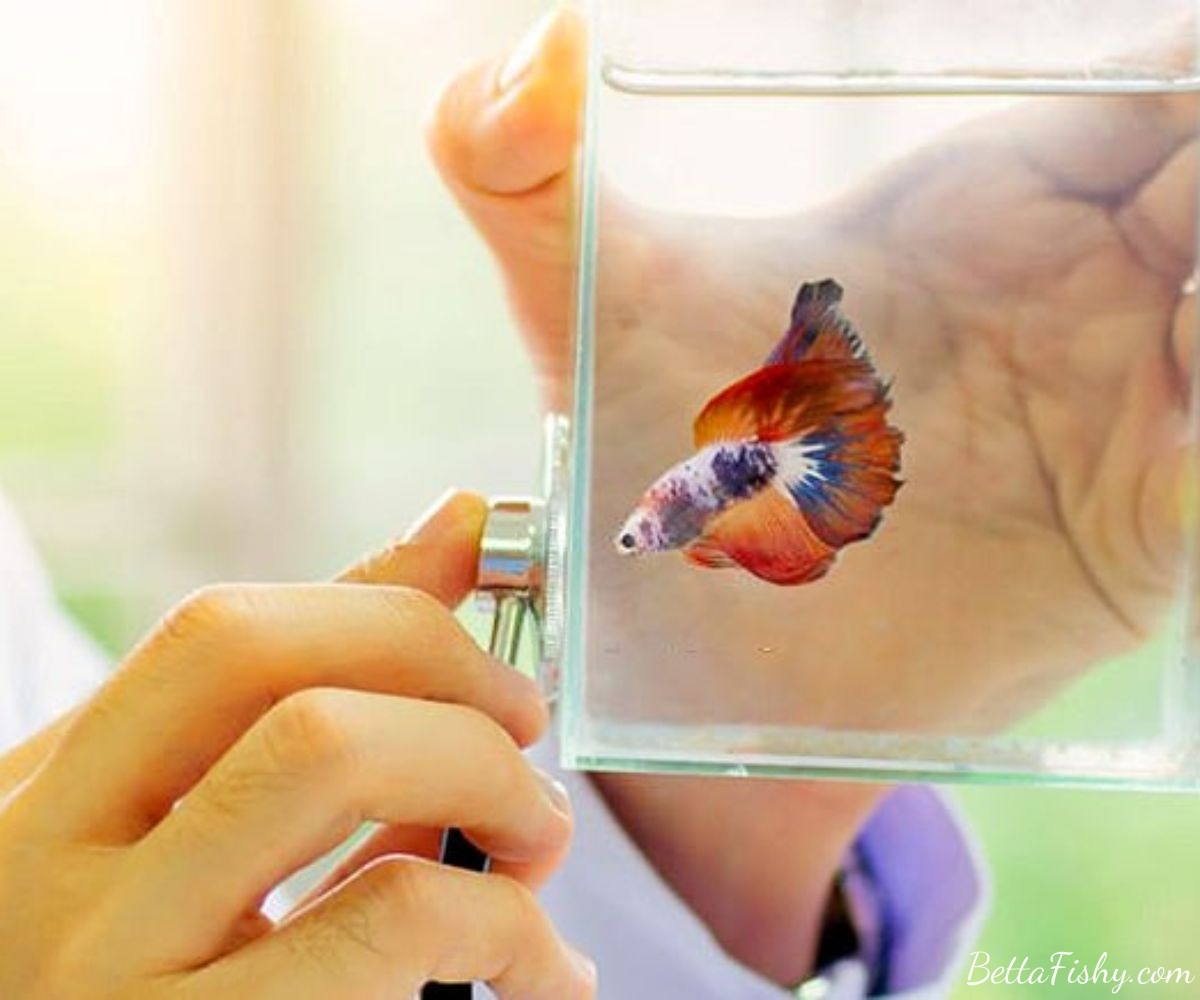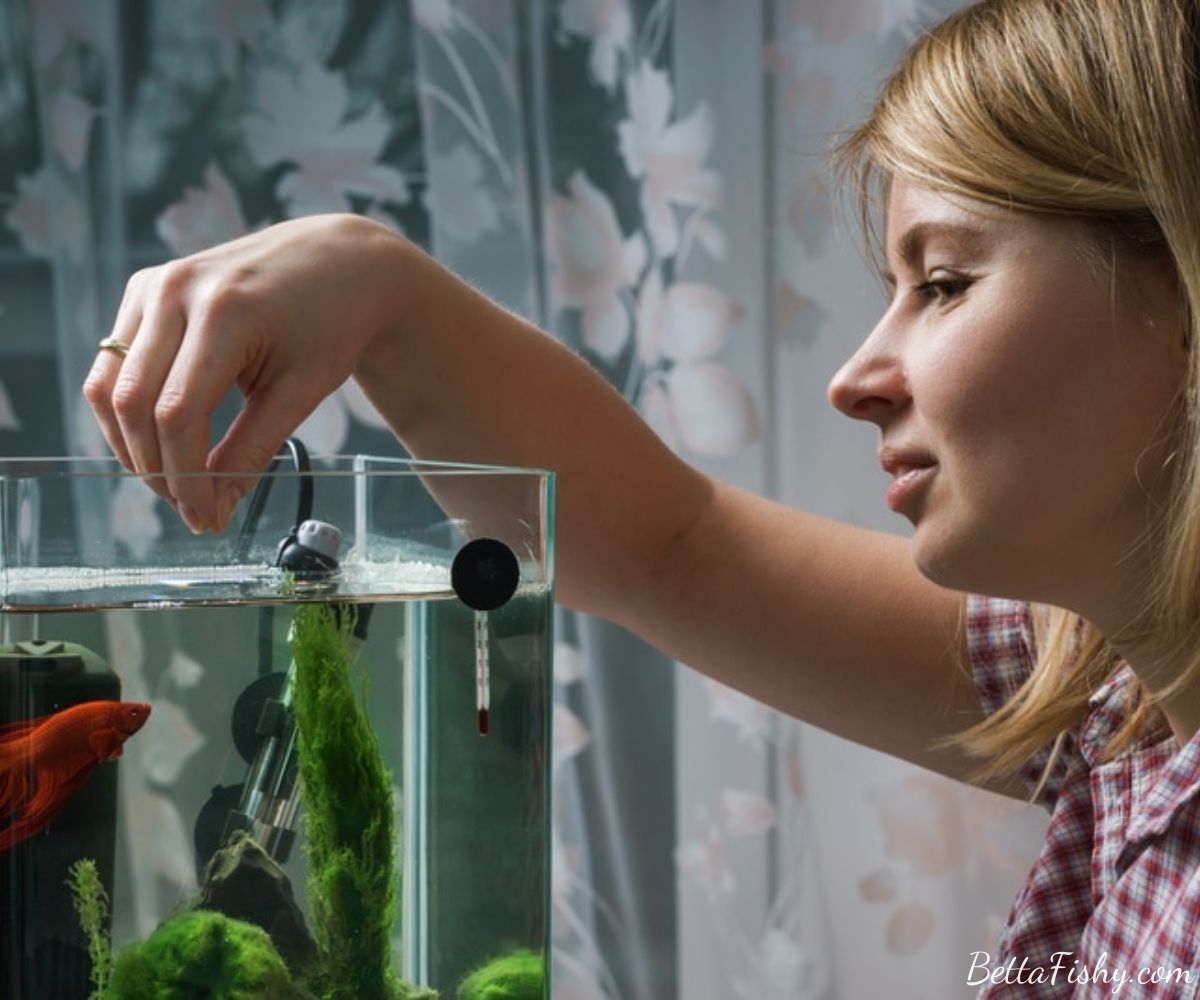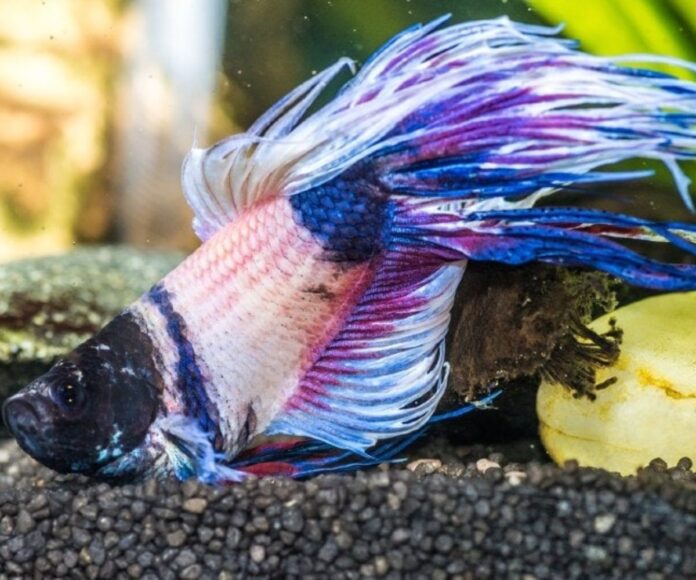Introduction
A betta fish’s digestive system is a crucial part of its overall health. While poop might not be the most glamorous topic, paying attention to betta fish poop can give you important clues about what’s going on inside your fish.
In this comprehensive guide, we’ll cover everything you need to know about betta poop. You’ll learn what healthy betta waste looks like, how often they should poop, and what unhealthy poop might signal. We’ll discuss why digestion matters so much for your betta’s health.
You’ll also discover how to keep your betta’s digestive system in tip-top shape through proper diet, tank conditions, and care. And if your fish does become constipated or have poop issues, we’ll explain remedies and treatments.
By the end, you’ll be a betta poop expert, able to monitor your fish’s health and catch any digestion problems early.
What is Normal Betta Fish Poop?

Healthy betta poop is typically brown, tan, or orange in color and round or pellet shaped. The color of the poop often reflects the color of the food the betta has been eating. Normal betta poop is quite small, around 1-3 mm in diameter.
Healthy poop will sink to the bottom of the tank, rather than float at the top. The texture should be solid and cohesive, not runny or stringy. Normal poop is passed in individual small clumps, not one long string.
Most sources recommend that a healthy betta should poop once or twice per day. You may see a small clump of poop in the morning after not feeding them overnight. Then they should poop again a few hours after eating. Bettas are private poopers and will hide to pass waste.
As you can see, normal poop is a solid brown color and quite small. Seeing this amount of waste daily is healthy for your betta’s digestive system.
Signs of Unhealthy Poop
While healthy betta poop is brown or black and about the size of the betta’s eye, unhealthy poop can vary in color, consistency, and frequency. Here are some signs that may indicate a digestive issue or constipation in your betta:
Color changes like exceptionally light brown, white, or pale poop can signal constipation. Constipated bettas pass poop that is lighter in color because their liver isn’t processing waste properly.
Stringy, mucus-like poop that trails behind the fish or hangs off the anus is also a red flag. This stringy poop is a symptom of constipation as the betta struggles to pass hard stool.
Infrequent pooping or a complete lack of poop over several days likely indicates constipation. Bettas should poop at least once per day. If yours goes longer without pooping, it could be blocked up.
Swim bladder disorders like floating, sinking, or trouble swimming can sometimes stem from constipation. Hard poop puts pressure on the bladder. Relieving constipation may resolve swim problems.
While any change in poop habits warrants monitoring, drastic shifts in color, consistency, and frequency signal your betta needs constipation relief and treatment.
Why Poop Matters for Betta Health?
Poop and digestive health are crucial for a betta’s wellbeing. While it may seem insignificant, a betta’s ability to properly digest food and eliminate waste is vital to its health. There are a few key reasons why poop and digestion matters so much for bettas:
Waste Elimination: Like all animals, bettas need to expel waste and toxins from their bodies. If they become constipated or unable to poop, these waste products can build up and poison the body. Bettas can suffer severe illness and even die from an intestinal blockage or other poop issues if not treated.
Signals Illness: The characteristics of a betta’s poop can reveal a lot about their health status. Changes in color, texture, or amount of poop may indicate an underlying infection, parasite, or other health problem. Keeping an eye on poop is an easy way to monitor a betta’s condition.
Toxicity if Constipated: If a betta cannot pass stool normally, the buildup of waste in their system can become toxic. Ammonia from waste can accumulate and poison the body, leading to organ damage, loss of appetite, lethargy, and eventual death if untreated. Prompt constipation treatment is crucial.
By paying attention to your betta’s poop, you can catch signs of illness early and ensure your fish stays regular. Don’t underestimate the importance of healthy poop and digestion for your betta’s wellbeing!
Treating Poop Problems
If your betta is showing signs of constipation or other poop issues, there are several remedies you can try at home before resorting to medications or seeing a vet:
Fasting
Not feeding your betta for 1-2 days can help clear their digestive tract and allow things to start moving again. Make sure to continue changing some of their water during the fast.
Feed Deshelled Peas
Peas are high in fiber and act as a natural laxative for bettas. Thaw a frozen pea, remove the shell, and feed a small piece to your betta. This should help them poop.
Water Changes
Changing some of the water in the tank can help improve water quality if waste is accumulating. Use a gravel vacuum to remove solid waste during water changes.
Aquarium Salt
Adding 1 teaspoon of aquarium salt per gallon of water can help bettas pass waste. Make sure to dissolve the salt fully before adding your betta back into the tank.
Medications
If natural remedies don’t work, use a gentle fish laxative medication from your local pet store. Follow product instructions carefully.
When to See a Vet

In most cases, constipation and unhealthy poop in bettas can be treated at home with some fasting, feeding peas, and monitoring water conditions. However, there are some instances when you should take your betta to see a veterinarian:
– If the constipation persists for more than 3-4 days even after attempting home treatment methods.
– If your betta stops eating or has a severely decreased appetite.
– If your betta seems lethargic, laying at the bottom of the tank, and unresponsive.
– If you notice any swelling in the betta’s abdomen or other signs of systemic illness.
A veterinarian can provide fluids and injectable medications to help relieve obstipation in bettas. They can also evaluate if an underlying illness is causing the poop problems.
Don’t delay – if your betta seems ill and his constipation won’t improve, take him to an aquatic vet right away. The sooner treatment begins, the better his chances of recovery.
Experience in avoiding effects on the digestive system of Bettas fish

The best way to avoid poop and digestive issues in your betta is through proper care and diet. Keep your betta’s tank clean and warm, feed them a high quality and varied diet, and ensure they get exercise through an enriching tank environment. Some tips for prevention include:
- Perform regular water changes and filter maintenance to keep ammonia levels low.
- Maintain a water temperature between 78-80°F.
- Feed a high quality betta pellet and supplement with frozen or live foods like brine shrimp or bloodworms.
- Avoid overfeeding and fast 1 day a week.
- Include aquarium plants like java moss to increase fiber.
- Provide places for your betta to explore and exercise, like plants, caves, driftwood.
Catching issues early is also important. Keep an eye on your betta’s poop daily and watch for signs of constipation or color changes. React quickly if you notice lack of appetite, lethargy, or anything unusual. Following the treatment steps as soon as you spot a problem can help prevent serious illness.
With proper care, diet, and attention, you can keep your betta’s digestive system working smoothly and avoid dangerous constipation issues. Stay vigilant and get to know what’s normal for your individual fish.
FAQ
Here are answers to some frequently asked questions about betta poop and digestion:
How often should my betta poop?
Healthy bettas will usually poop 1-2 times per day. You may not witness your betta pooping each time since their poops are small, but you should see some waste accumulating in the tank daily.
What does constipation in bettas look like?
Constipated bettas may exhibit clamped fins, lethargy, lack of appetite, and most notably infrequent or absent poop. Their poop may come out appearing very hard or stringy if they are constipated.
Should I fast my betta if they are constipated?
Yes, fasting your betta for 1-2 days can help relieve mild constipation. Be sure to still change some of the water during a fast day.
How can I prevent constipation in my betta?
Feeding a high-fiber diet with live or frozen foods, keeping tank water clean and warm, and limiting freeze-dried foods can all promote good digestion. Avoid overfeeding.
Why is my betta’s poop white and stringy?
White, stringy poop may indicate an internal parasite infection. This should be treated with anti-parasitic medications. Seek vet advice if it persists.
When should I seek vet help for poop issues?
Contact an exotic vet if poop problems don’t resolve after fasting, if your betta stops eating entirely, displays lethargy or swelling, or has persisting white stringy poop indicating parasites.
Conclusion
In summary, paying attention to your betta fish’s poop provides important clues about their health. Normal betta fish poop is brown or black, segmented, and roughly the size of the betta’s eye. Bettas should poop 1-2 times per day. Irregular poop color, shape, or frequency can signal constipation or other illnesses.
Maintaining good water quality, proper diet, exercise, and avoiding overfeeding helps keep your betta’s digestive system working smoothly. If a betta becomes constipated or has unhealthy poop, try fasting, feeding peas, adjusting temperature, or using aquarium salt before medications. Seek vet care if the issue persists or the betta seems ill.
Understanding your betta’s normal poop habits allows you to notice problems early and take action to keep them healthy. With proper care of their digestion and tank, bettas can live happy, regular pooping lives!


